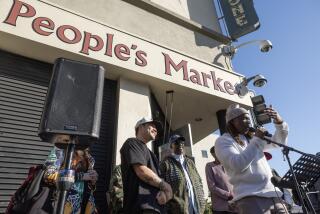Dinkins Tries to Break Black Boycott of Korean Stores : Race: New York mayor shops at market to show support for owners. Tensions remain high eight months after incident with customer.
- Share via
NEW YORK — Mayor David N. Dinkins made a symbolic shopping trip Friday to two Korean produce stores that have been picketed since January in a nasty dispute that has focused national attention on the tension between immigrant Asian merchants and their black customers.
The mayor purchased four apples and several handfuls of potatoes--total $3.50--at the Family Red Apple store in Brooklyn while a handful of black pickets kept at a distance by a court order shouted curses.
“I’m delighted to be here,” said Dinkins, who was booed earlier this week by Korean-Americans at a City Hall rally. “Where are the fruits and vegetables?” he asked Red Apple’s manager, Sang Lee. “I love baked potatoes.”
“The boycott should end,” the mayor declared as he selected dinner.
Dinkins, New York’s first black mayor, told store employees that some of the pickets perceived a real grievance, but “there are others on that line that have been guilty of saying things that are racist.”
As the prices of the potatoes and red and green apples were being totaled, the mayor said he hoped to return to the store and “get a soda and an apple” and find the shop filled with customers. He challenged other politicians to join him in breaking the boycott.
“Not bad,” said Lee after Dinkins had departed, even though the protesters showed no signs of heeding Dinkins’ words.
The boycott of the two stores--the Family Red Apple and Church Avenue Fruit--began after a 45-year-old Haitian woman, Giselaine Felissaint, entered Family Red Apple and took plantains costing $2 and limes priced at $1 to the cashier. According to the store’s owners, she paid only $2 and, when the cashier demanded the difference, Felissaint allegedly hurled a pepper at the cashier. She was told to depart but fell to the floor. Employees said other customers told her to remain on the floor until police officers arrived. She was taken to a hospital, treated and released.
Felissaint’s lawyer paints a different picture--that store employees accused her of shoplifting and ordered her to open her bag. Her lawyer contends that two employees beat her when she refused. She has filed a $6-million lawsuit against the shop’s owners.
The second store, Church Avenue Fruit, became a party to the dispute when, protesters charge, a Red Apple employee who allegedly participated in beating Felissaint took refuge in that shop.
Soon after the incident, some residents began picketing, calling for the shops to be shut. The boycott led to daily confrontations, with racial epithets hurled and bitterness growing in both communities.
More than eight months after the original incident, emotions remain high. On Tuesday, Korean-American demonstrators at a City Hall rally booed Dinkins even though he announced that police would enforce a restraining order to keep pickets from the entrance to the two grocery stores. The day before, a state appeals court had ordered the police to enforce the ruling.
On Friday, after months of trying to mediate the dispute, Dinkins finally came down directly on the side of Korean-American shopkeepers. Before visiting both stores, situated directly across from each other on Church Avenue in Brooklyn’s Flatbush section, he stood on the sidewalk and read a statement.
The mayor said that the protest so far had defied all attempts at mediation.
“Some of those involved have refused to participate in a way that would allow it to come to an end,” Dinkins said. “They wished only to beat these store owners into submission and to force them out of business.
“Whatever may have happened here in January to touch off this boycott--and there remains some dispute about what did happen--forcing these shopkeepers out of business amounts to cruel and unusual punishment,” the mayor added.
Earlier in the day, before traveling to Brooklyn, Dinkins met with reporters and editors at a breakfast in the Washington Bureau of the Los Angeles Times. He defended New York’s image in the wake of bad publicity, including a highly critical recent cover story in Time magazine.
“The notion that New York somehow has gone to hell in a hand basket is one that we reject. Of course, we have our problems, but we’re addressing them,” Dinkins said.
Goldman reported from New York, Tumulty from Washington.
More to Read
Sign up for Essential California
The most important California stories and recommendations in your inbox every morning.
You may occasionally receive promotional content from the Los Angeles Times.













